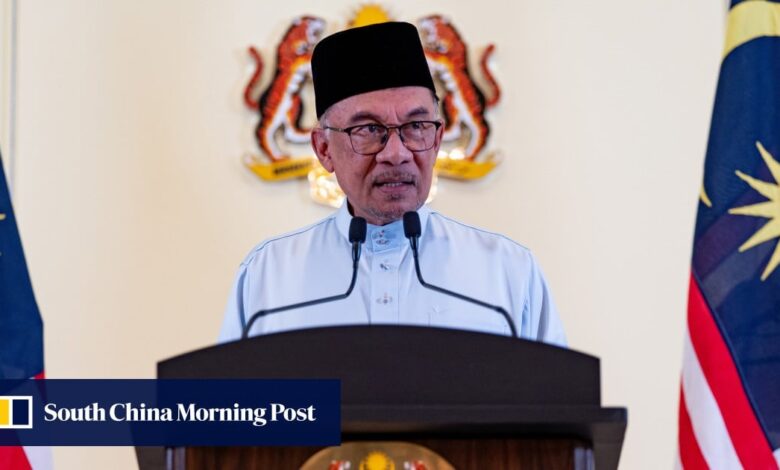As Malaysia’s Anwar Ibrahim reaches out to Malays-Muslims, can he be ‘everyone’s PM’?

[ad_1]
“Day by day [Anwar] disappoints and dismays,” said Ignatius, who is of Indian descent.
To beat Malaysia’s ‘green wave’, PM Anwar must do more for struggling Malays
To beat Malaysia’s ‘green wave’, PM Anwar must do more for struggling Malays
Anwar was long associated with a moderate brand of Islam and an inclusive Malaysia.
But far from acting as a bulwark to the march of hardliners marshalled by a monoethnic, Islamist opposition, since forming a unity government in November, he has made decisions that critics say undermine that reputation by appealing to religious zealots whose footprint in the Malay heartlands is widening.
Malaysia’s non-Muslim population – some 44 per cent of its 33.4 million people – is made up primarily of ethnic Chinese, at around 6.7 million, and Indians at around 2 million, alongside other smaller ethnic groups, particularly the Ibans in Sarawak and Kadazan Dusuns in Sabah.
While Islam is enshrined as the state religion under the constitution, that same document also guarantees the freedom of religion for all.
But this settlement – in place since independence in 1957 – is being tested.

In August, the PAS-led Perikatan Nasional coalition won 146 of the 245 seats contested in state elections, even making inroads in the economic powerhouses of Penang and Selangor – with high non-Muslim populations.
In the election run-up, Anwar’s administration did its best to appeal to the Malay majority, experts say.
Since the state elections, he has tried what many say is impossible: appealing to the Malay heartlands while insisting on maintaining the country’s multicultural make-up.
God willing, the unity government will defend the rights of every people on this blessed earth
In his National Day speech on Wednesday, Anwar touched on the sensitive issues between the country’s numerous diverse communities and pledged to defend everyone’s rights.
“God willing, the unity government will defend the rights of every people on this blessed earth,” he said.
Yet division abounds. Abdul Hadi Awang, who has led PAS since 2002, has repeatedly made unsavoury statements towards non-Muslims, saying they should be grateful to be “given a place” in Malaysia, and accusing them of “ruining the country’s politics and economy” by being the leading cause of corruption.
While campaigning for a by-election on Sunday last week, Abdul Hadi told voters that they would be judged by God based upon who they elected.
“When choosing leaders, it must be Islam that leads,” he said. “Non-Muslims cannot [lead].”
While alarmed by the lurch to the right, some non-Muslims say they understand Anwar’s outreach to conservatives, detecting pragmatism instead of overzealous religiosity in his moves to assuage the Malay majority, who account for two-thirds of voters.
“We all already know Anwar is quite religious, but his policy is more moderate,” said a doctor of Chinese descent in Kuala Lumpur, who only wished to be identified as Leong. “I also understand how he is losing Malay trust, so he is doing it to regain it.”
Measured response
A recent policy that has been widely talked about is the introduction of the “Imam al-Nawawi 40 Hadith” appreciation module, which seeks to espouse to the country’s schoolchildren values from the sayings of the Prophet Muhammad.
Launched on August 19 by Education Minister Fadhlina Sidek, the module was meant as a remedy for growing extremism among Muslim youth. But hazy messaging at its launch led some groups, including the Malaysian Consultative Council of Buddhism, Christianity, Hinduism, Sikhism and Taoism, to worry that it would later be introduced to all students.
Malaysia’s previous government would have banned Anwar biopic: cartoonist Zunar
Malaysia’s previous government would have banned Anwar biopic: cartoonist Zunar
“It is really similar, the overreaction over those three pages,” communications student Jacinta Chen told This Week in Asia. “This time around, many felt that the Chinese-language media and politicians shouldn’t similarly overreact.”
Pointing to a recent YouTube video on the topic by BBK Network, a local channel popular with Mandarin-speaking Malaysian youths, Chen said that many of them understood clearly that the modules were a Muslim matter, negating the need for alarm among the Chinese community.
“If this policy does not touch non-Muslims, but the Chinese community makes it a big topic, are we not doing the same thing, intervening in Muslim affairs?” asked one commenter Kenny Chin.
Political analyst Oh Ei Sun however said that to many non-Muslims in Muslim-majority nations, Islamic piety was inextricably linked with fundamentalism and extremism.
“So to them, they live in absolute and constant and abject fear of at least being subject to what they view as utterly irrational Islamic rule,” Oh said.
Reflecting on Malaysia, he said that at this moment, fear was generated by the potential of a Malaysia ruled by PAS rather than Anwar.
“But we simply don’t know how things will evolve,” he said.
The Indian community meanwhile says it is increasingly unrepresented by the two major coalitions, with no strong presence in Perikatan Nasional, and feeling sidelined in Anwar’s Pakatan Harapan, where the focus has been more on Malay-Muslims and Chinese voters.
“I feel like we have to shout louder to get attention these days,” said Michael Veerapan, an engineer in Klang. “Many issues involving the Indians are still up in the air; statelessness, death in detention, education.”
Key leaders in the community such as Charles Santiago, an outspoken human rights activist and parliamentarian, and Penang’s former deputy chief minister P. Ramasamy have both been dropped by Pakatan Harapan in recent elections.
Rama Ramanathan, a spokesman for Citizens Against Enforced Disappearances who was recently in the Facebook spotlight for saying that he hoped to study “Imam al-Nawawi’s 40 Hadith” module to help him “understand Islam better”, said Anwar was in an unenviable position with having to juggle the concerns of the varied communities that make up Malaysia.
“Being everyone’s prime minister means also being the prime minister for Muslims,” said Rama, who also advocates for police reform in Malaysia.
[ad_2]
Source link






